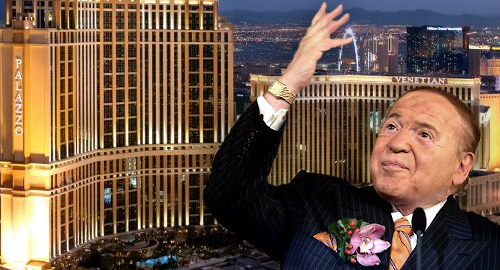
Casino titan Sheldon Adelson has died following complications from cancer treatment, bringing down the curtain on a life of incredible success and equally incredible controversy.
Early Tuesday, casino operator Las Vegas Sands announced that Adelson had passed away on Monday night at the age of 87 due to complications from his treatment for non-Hodgkins lymphoma. The company announced just last week that Adelson was taking medical leave, the second such round following the original announcement of his cancer diagnosis in the spring of 2019.
From humble origins in Boston, Adelson founded Las Vegas Sands in 1989 through his purchase of the faded Sands Hotel in Las Vegas. Adelson is largely credited with pioneering the ‘integrated resort’ casino model, relying on non-gaming amenities – particularly the meetings, incentives, conferences and events (MICE) aspect – to draw guests who would then mosey on over to the gaming floor during their stay.
Sands eventually became the world’s largest casino operator, with highly lucrative properties in the US, Singapore and Macau. The latter market bolstered Adelson’s reputation as a visionary when he chose to build up a then-swampy area known as Cotai on which the region’s most impressive gambling palaces now stand.
Adelson’s success made him one of the world’s wealthiest individuals and he used his economic clout for purposes both laudatory and suspect. Examples of the former include his recent decision to continue paying Sands casino staff “as though they were still working,” despite the pandemic-related closure of casinos, a stance not followed by his casino rivals.
But Adelson’s bottomless reserves also supported more ignoble aims, including an unrepentant ‘cash-and-carry’ approach to political donations. Adelson spent hundreds of millions of dollars supporting candidates willing to act on behalf of his pet causes, such as his support for the state of Israel and his crusade against online gambling.
While the latter effort failed to halt the spread of online legislation across the US, it certainly slowed such progress, and the courts have yet to resolve questionable challenges of Wire Act definitions launched by a Trump administration grateful for Adelson’s outsized contributions.
Adelson justified his anti-online stance by claiming that it was a “moral issue,” based on his unsubstantiated belief that online gambling was more addictive than the land-based variety he peddled to the masses and made him obscenely rich. Adelson once suggested that advocating for legal online gambling was the same as pushing for legal cocaine and heroin.
Adelson betrayed his lack of understanding of the modern digital world – he famously didn’t even use email – by claiming that online gambling operators had no way to filter out underage gamblers. That stance was particularly rich given the number of times Sands was financially penalized after being caught serving alcohol to underage gamblers on his properties’ casino floors.
Adelson also lobbied hard against legalizing marijuana, a stance borne out of personal pain, having lost a son to a drug overdose in 2005. But Adelson’s company was fined $47.4m in 2013 for failing to be sufficiently curious regarding an alleged Mexican methamphetamine dealer’s $85m in financial transfers to Sands casinos.
The world learned last Friday that Sands president Rob Goldstein was negotiating with sports betting suppliers regarding Sands expanding its wagering options to take advantage of America’s new regulatory opportunities. Should this effort include an online component – and the market will almost certainly demand it – it will confirm that Adelson’s anti-online view wasn’t shared by the senior managers who assisted his incredible success.
Adelson has earned a place in history as the world’s most successful casino entrepreneur, effectively the gambling world’s Charles Foster Kane, with all of the associated baggage of that fictional character’s political legacy. Love him or loathe him, the world may not see his equivalent again.
